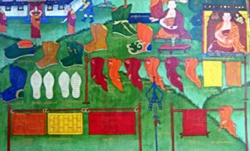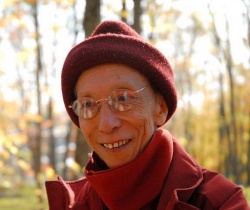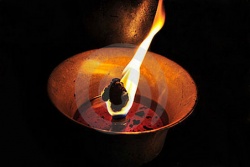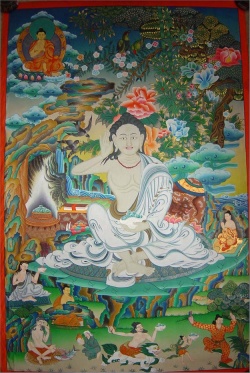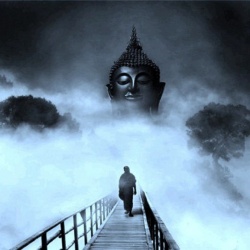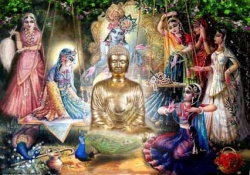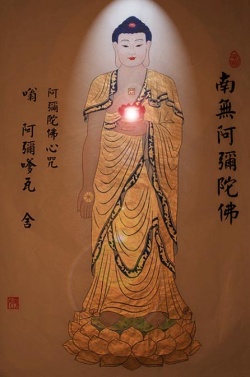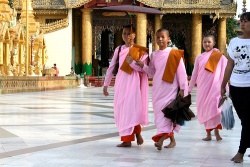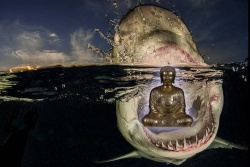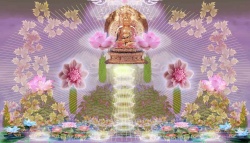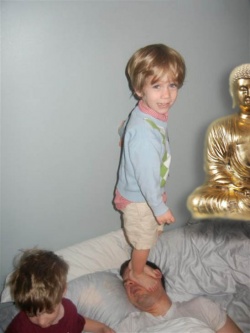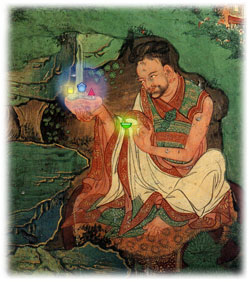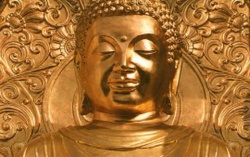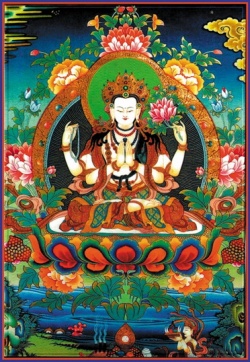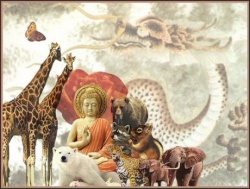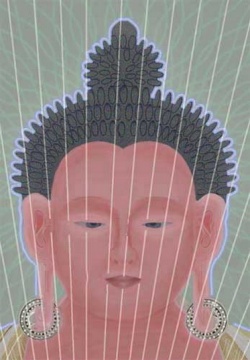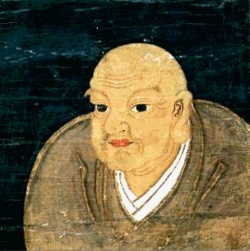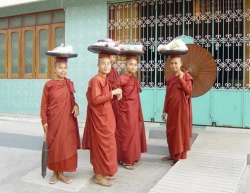Mahasudassana Sutta
Once the Lord was staying at Kusinara in the Mallas' sal-grove shortly before his final Nibbana between the twin sal-trees.
The Venerable Ananda came to the Lord, saluted him, sat down to one side and said: "Lord, may the Blessed Lord not pass away in this miserable little town of wattle-and-daub, right in the jungle in the back of beyond! Lord, there are other great cities such as Campa, Rajagaha, Savatthi, Saketa, Kosambi or Varanasi. In those places there are wealthy Khattiyas, Brahmins and householders who are devoted to the Tathagatha and they will provide for the Tathagatha's funeral in proper style."
"Ananda, don't call it a miserable little town of wattle-and-daub, right in the jungle in the back of beyond! Once upon a time, Ananda, King Mahasudassana was a wheel-turning monarch, a rightful and righteous king, who had conquered the land in four directions and ensured the security of his realm. And this King Mahasudassana had this very Kusinara, under the name of Kusavati, for his capital. And it was twelve yojanas long from east to west, and seven yojanas wide from north to south. Kusavati was rich, prosperous and well-populated, crowded with people and well-stocked with food. Just as the deva-city of Alakamanda is rich..., so was the royal city of Kusavati. And the city of Kusavati was never free of ten sounds by day or night: the sound of elephants, horses, carriages, kettle-drums, side-drums, lutes, singing, cymbals and gongs, with cries of 'Eat, drink and be merry' as tenth.
"The royal city of Kusavati was surrounded by seven encircling walls. One was of gold, one silver, one beryl, one crystal, one ruby, one emerald, and one of all sorts of gems.
"Kusavati was surrounded by seven rows of palm-trees, of the same materials. The gold trees had gold trunks with silver leaves and fruit, the silver trees had silver trunks with gold leaves and fruit. The beryl had beryl trunks with crystal leaves and fruit, the crystal trees had crystal trunks with beryl leaves and fruit. The ruby trees had ruby trunks and emerald leaves and fruit, the emerald trees had emerald trunks and ruby leaves and fruit, while the trees of all sorts of gems were the same as regards trunks, leaves and fruit. The sound of the leaves stirred by the wind was lovely, delightful, sweet and intoxicating, just like that of the five kinds of musical instruments played in concert by well-trained and skillful players. And, Ananda, those who were libertines and drunkards in Kusavati had their desires assuaged by the sound of the leaves in the wind.
"King Mahasudassana was endowed with the seven treasures and the four properties. What are the seven? Once, on a fast-day, the divine Wheel-Treasure appeared to him, thousand-spoked, complete with felloe, hub and all appurtenances. On seeing it, King Mahasudassana thought: 'I have heard that when a duly anointed Khattiya kings sees such a wheel on the fast-day of the fifteenth, he will become a wheel-turning monarch. May I become such a monarch!'
"Then, rising from his seat, covering one shoulder with his robe, the King took a gold vessel in his left hand, sprinkled the Wheel with his right hand, and said: 'May the noble Wheel-Treasure turn, may the noble Wheel-Treasure conquer!' The Wheel turned to the East, and King Mahasudassana followed it with his fourfold army. And in whatever country the Wheel stopped, the King took up residence with his fourfold army.
"And, those kings who faces him in the eastern region came and said: 'Come, Your Majesty, welcome! We are yours, Your Majesty. Rule us, Your Majesty!' And the King said: 'Do not take life. Do not take what is not given. Do not commit sexual misconduct. Do not tell lies. Do not drink strong drink. Be moderate in eating.' And those who had faced him in the eastern region became his subjects.
"And when the Wheel had plunged into the eastern sea, it emerged and turned south, and King Mahasudassana followed it with his fourfold army. And those Kings...became his subjects. Having plunged into the southern sea it turned west..., having plunged into the western sea it turned north, and King Mahasudassana followed it with his fourfold army...and those who had faced him in the northern region became his subjects.
"Then the Wheel-Treasure, having conquered the lands from sea to sea, returned to the royal capital of Kusavati and stopped before the King's palace as he was trying a case, as if to adorn the royal palace. And this is how the Wheel-Treasure appeared to King Mahasudassana.
"Then the Elephant-Treasure appeared to King Mahasudassana, pure white, of sevenfold strength, with the wonderful power of traveling through the air, a royal tusker called Uposatha. Seeing him, the King thought: 'What a wonderful riding-elephant, if only he could be brought under control!' And this Elephant-Treasure submitted to control just like a thoroughbred that had been trained for a long time. And once the King, to try him, mounted the Elephant-Treasure at crack of dawn and rode him from sea to sea, returning to Kusavati in time for breakfast. And that is how the Elephant-Treasure appeared to King Mahasudassana.
"Then the Horse-Treasure appeared to King Mahasudassana, with a crow's head, dark-maned, with the wondrous power of traveling through the air, a royal stallion called Valahaka. And the King thought: 'What a wonderful mount, if only he could be brought under control!' And this Horse-Treasure submitted to control just like a thoroughbred that had been trained for a long time...And that is how the Horse-Treasure appeared to King Mahasudassana.
"Then the Jewel-Treasure appeared to King Mahasudassana. It was beryl, pure, excellent, well-cut into eight facets, clear, bright, unflawed, perfect in every respect. The luster of this Jewel-Treasure radiated for an entire yojana round about. And once the King, to try it, went on night-maneuvers on a dark night with his four-fold army, with the Jewel-Treasure fixed to the top of his standard. And all who lived in the villages round about started their daily work, thinking it was daylight. And that is how the Jewel-Treasure appeared to King Mahasudassana.
"Then the Woman-Treasure appeared to King Mahasudassana, lovely, fair to see, charming, with a lotus-like complexion, not too tall or too short, not too thin or too fat, not too dark or too fair, of more than human, deva-like beauty. And the touch of the skin of the Woman-Treasure was like cotton or silk, and her limbs were cool when it was hot, and warm when it was cold. Her body smelt of sandal-wood and her lips of lotus. This Woman-Treasure rose before the King and retired later, and was always willing to do his pleasure, and she was pleasant of speech. And this Woman-Treasure was not unfaithful to the King even in thought, much less in deed. And that is how the Woman-Treasure appeared to King Mahasudassana.
"Then the Householder-Treasure appeared to King Mahasudassana. With the divine eye which, as the result of kamma, he possessed, he saw where treasure, owned and ownerless, was hidden. He came to the King and said: 'Have no fear, Your Majesty, I will look after your wealth properly.' And once, the King, to try him, went on board a ship and had taken to the current in the middle of the Ganges. Then he said to the Householder-Treasure: 'Householder, I want some gold coin!' 'Well then, Sire, let the ship be brought to one bank.' 'I want the gold coins here!' Then the householder touched the water with both hands and drew out a vessel full of gold coins, saying: 'Is that enough, Sire? Will that do, Sire?' and the King said: 'That is enough, householder, that will do, you have served me enough.' And that is how the Householder-Treasurer appeared to King Mahasudassana.
"Then the Counselor-Treasure appeared to King Mahasudassana. He was wise, experienced, clever and competent to advise the King on how to proceed with what should be proceeded with, and to withdraw from what should be withdrawn from, and to overlook what should be overlooked. He came to the King and said: 'Have no fear, Your Majesty, I shall advise you.' And that is how the Counselor-Treasure appeared to King Mahasudassana, and how he was equipped with all the seven treasures.
"Again, Ananda, King Mahasudassana was endowed with the four properties. What are they? Firstly, the King was handsome, good to look at, pleasing, with a complexion like the finest lotus, surpassing other men.
"Secondly, he was long-lived, outliving other men.
"Thirdly, he was free from illness, free from sickness, with a healthy digestion, less subject to cold and heat than that of other men.
"Fourthly, he was beloved and popular with Brahmins and householders. Just as a father is beloved by his children, so he was with Brahmins and householders. And they were beloved by the King as children are beloved by their father. Once the King set out for the pleasure-park with his fourfold army, and the Brahmins and householders came to him and said: 'Pass slowly by, Sire, that we may see you as long as possible!' And the King said to the charioteer: 'Drive the chariot slowly so that I can see these Brahmins and householders as long as possible.' Thus King Mahasudassana was endowed with these four properties.
"Then King Mahasudassana thought: "Suppose I were to construct lotus-ponds between the palm-trees, a hundred bow-lengths apart.' And he did so. The lotus-ponds were lined with four-colored tiles, gold, silver, beryl, and crystal, each pond being approached by four staircases, one gold, one silver, one beryl and one crystal. And the gold staircase had gold posts with silver railings and banisters, and so on. And the lotus-ponds were provided with two kinds of parapet, gold and silver--the gold parapets having gold posts, silver railings and banisters, and the silver parapets having silver posts, gold railings and banisters.
"Then the King thought: "Suppose I were to provide each pond with suitable flowers for garlands--blue, yellow, red and white lotuses which will last thought all seasons without fading?' And he did so. Then he thought: 'Suppose I were to place bathmen on the banks of these ponds, to bathe those who come there?' And he did so. Then he thought: 'Suppose I were to establish charitable posts on the banks of these ponds, so that those who want food can get it, those who want drink can get it, those who want clothes can get it, those who want transport can get it, those who want a sleeping-place can get it, those who want a wife can get one, and those who want gold coin can get it?' And he did so.
"Then the Brahmins and householders took great wealth and went to the King, saying: 'Sire, here is wealth that we have gathered together especially for Your Majesty, please accept it!' 'Thank you, friends, but I have enough wealth from legitimate revenues. Let this be yours, and take away more besides!' Being thus refused by the King, they withdrew to one side and considered: 'It would not be right for us to take this wealth back home again. Suppose we were to build a dwelling for King Mahasudassana.' So they went to the King and said: 'Sire, we would build you a dwelling', and the King accepted by silence.
"Then Sakka, ruler of the gods, knowing in his mind King Mahasudassana's thought, said to the attendant-deva Vissakamma: 'Come, friend Vissakama, and build a dwelling for King Mahasudassana, a palace called Dhamma.' 'Very good, Lord', Vissakamma replied and, as swiftly as a strong man might stretch his flexed arm or flex it again, he at once vanished from the Heaven of the Thirty-Three and appeared before King Mahasudassana, and said to him: 'Sire, I shall build you a dwelling, a palace called Dhamma.' The King assented by silence, and Vissakamma build him the Palace of Dhamma.
"The Palace of Dhamma, Ananda, was a yojana in length from east to west, and half a yojana wide from north to south. The whole palace was faced up to three times a man's height with tiles of four colors, gold, silver, beryl, and crystal, and it contained eighty-four thousand columns of the same four colors. It had twenty-four staircases of the same four colors, and the gold staircases had gold posts with silver railings and banisters...It also had eighty-four thousand chambers of the same colors. In the gold chamber was a silver couch, in the silver chamber a gold couch, in the beryl chamber an ivory couch, and in the crystal chamber a sandal-wood couch. On the door of the gold chamber a silver palm-tree was figured, with silver stem, gold leaves and fruit...On the door of the silver chamber a golden palm-tree was figured, with golden trunk, leaves and fruit, on the door beryl chamber a crystal palm-tree was figured, with crystal trunk and beryl leaves and fruit, on the door of the crystal chamber a beryl palm-tree was figured, with crystal leaves and fruit.
"Then the King thought: 'Suppose I were to make a grove of palm-trees all of gold by the door of the great gabled chamber where I sit in the daytime?' and he did so.
"Surrounding the Dhamma Palace were two parapets, one of gold, one of silver. The gold one had gold posts, silver railings and banisters, and the silver one had silver posts, gold railings and banisters.
"The Dhamma Palace was surrounded by two nets of tinkling bells. One net was gold with silver bells, the other silver with gold bells. And when these nets of bells were stirred by the wind their sound was lovely, delightful, sweet and intoxicating, just like that of the five kinds of musical instruments played in concert by well-trained and skillful players. And those who were libertines and drunkards in Kusavati had their desires assuaged by the sound of those nets of bells.
"And when the Dhamma Palace was finished, it was had to look at, dazzling to the eyes, just as in the last month of the Rains, in autumn, when there is a clear and cloudless sky, the sun breaking thorough the mists is hard to look at, so was the Dhamma Palace when it was finished.
"Then the King thought: 'Suppose I were to make a lotus-lake called Dhamma in front of the Dhamma Palace?' so he did so. This lake was a yojana long from eat to west, and half a yojana wide from north to south, and lined with four kings of tiles, gold, silver, beryl and crystal. There were twenty-four staircases to it of four different kinds: gold, silver, beryl and crystal. The gold staircases had gold posts with silver railings and banisters, the silver had gold railings and banisters...
"Then Dhamma Lake was surrounded by seven kinds of palm-trees. The sound of the leaves stirred by the wind was lovely, delightful, sweet and intoxicating, just like that of the five kinds of musical instruments played in concert by well-trained and skillful players. And, Ananda, those who were libertines and drunkards in Kusavati had their desires assuaged by the sound of the leaves in the wind.
"When the Dhamma Palace and the Dhamma Lake were finished, King Mahasudassana, having satisfied every wish of those who at the time were ascetics or Brahmins, or revered as such, ascended into the Dhamma Palace.
"Then, King Mahasudassana thought: 'Of what kamma is it the fruit, of what kamma is it the result, that I am now so mighty and powerful?' Then he thought: 'It is the fruit, the result of three kinds of kamma: of giving, self-control, and abstinence.'
"Then the King went to the great gabled chamber and, standing at the door, exclaimed: 'May the thought of lust cease! May the thought of ill-will cease! May the thought of cruelty cease! Thus far and no further the thought if lust, of ill-will, of cruelty!'
"Then the King went into the great gabled chamber, sat down cross-legged on the golden couch, and detached from all sense-desires, detached from unwholesome mental states, entered and remained in the first jhana, which is with thinking and pondering, born of detachment, filled with delight and joy. And with the subsiding and oneness of mind, he entered and remained in the second jhana, which is without thinking and pondering, born of concentration, filled with delight and joy. And with the fading away of delight, remaining imperturbable, mindful and clearly aware, he experienced in himself that joy of which the Noble-Ones say: 'Happy is he who dwells with equanimity and mindfulness', he entered and remained in the third jhana. And, having given up pleasure and pain, and with the disappearance of former gladness and sadness, he entered and remained in the fourth jhana which is beyond pleasure and pain, and purified by equanimity and mindfulness.
"Then the King, emerging from the great gabled chamber, went to the golden gabled chamber and, seated crosslegged on the silver couch, stayed pervading first one quarter, then the second, the third and the fourth quarter with a mind filled with loving-kindness. Thus he stayed, spreading the thought of loving-kindness above, below and across, everywhere, always with a mind filled with loving-kindness, abundant, magnified, unbounded, without hatred or ill-will. And he did likewise with compassion, sympathetic joy, and equanimity.
"Of King Mahasudassana's eighty-four thousand cities, his capital Kusavati was the chief; of his eighty-four thousand palaces Dhamma was the chief; of his eighty-four thousand gabled halls the great gabled chamber was the chief; his eighty-four thousand couches were of gold, silver, ivory, sandal-wood, covered with fleece, wool, spread with kadali-deer hide, with head-covers, with red cushions at both ends; of his eighty-four thousand elephants adorned with gold ornaments, with gold banners and spread with gold nets, Uposatha the royal tusker was chief; of his eighty-four thousand carriages, covered with lion-skins, tiger-skins, leopard-skins or with orange-colored cloth, adorned with gold ornaments, gold banners and spread with gold nets, the chariot Vejayanta was the chief; of his eighty-four thousand wives Queen Subhadda was the chief; of his eighty-four thousand householders the Householder-Treasure was the chief; of his eighty-four thousand Khattiya retainers the Counselor-Treasure was the chief; his eighty-four thousand cows had tethers of fine jute and milk-pails of silver; his eighty-four thousand bales of clothing were of the finest linen, cotton, silk and wool; his eighty-four thousand rice-offerings were there for the taking by those in need, evening and morning.
"And at the time, King Mahasudassana's eighty-four thousand elephants waited on him evening and morning. And he thought: 'These eighty-four thousand elephants wait on me evening and morning. How if, at the end of each century, forty-two thousand elephants were to wait on me, turn and turn about?' And he gave instructions accordingly to his Counselor-Treasure, and it was done.
"And, Ananda, after many hundred, many hundred thousand years, Queen Subhadda thought: 'It is a long time since I saw King Mahasudassana. Suppose I were to go and see him?' So she said to her women: 'Come now, wash your heads and put on clean clothes. It is long since we saw King Mahasudassana. We shall go see him.' 'Yes, Your Majesty', they said, and prepared themselves as ordered, then returned to the Queen. And Queen Subhadda said to the Counselor-Treasure: 'Friend Counselor, draw up the fourfold army. It is long since we saw King Mahasudassana. We shall go and see him.' 'Very good, Your Majesty', said the Counselor-Treasure and, having drawn up the fourfold army, he reported to the Queen: 'Now is the time to do as Your Majesty wishes.'
"Then Queen Subhadda went with the fourfold army and her womenfolk to the Dhamma Palace and, entering, went to the great gabled chamber and stood leaning against the door-post. And King Mahasudassana, thinking: 'What is this great noise, as of a crowd of people?' came out of the door and saw Queen Subhadda leaning against the door-post. And he said: 'Stay there, Queen! Do not enter!'
"Then King Mahasudassana said to a certain man: 'Here, fellow, go to the great gabled chamber, bring the gold couch out and lay it down along the gold palm-trees.' 'Very good, Sire,' said the man, and did so. Then King Mahasudassana adopted the lion-posture on his right side with one foot on the other, mindful and clearly aware.
"Then Queen Subhadda thought: 'King Mahasudassana's faculties are purified, his complexion is clear and bright, oh--I hope he is not dead!' So she said to him: 'Sire, of your eighty-four thousand cities, Kusavati is the chief. Make a wish, arouse the desire to live there!' Thus, reminding him of all his royal possessions she exhorted him to wish to stay alive.
"At this, King Mahasudassana said to the Queen: 'For a long time, Queen, you spoke pleasing, delightful, attractive words to me, but now at this last time your words have been unpleasing, undelightful, unattractive to me.' 'Sire, how then am I to speak to you?'
"'This is how you should speak: 'All things that are pleasing and attractive are liable to change, to vanish, to become otherwise. Do not, Sire, die filled with longing. To die filled with longing is painful and blameworthy. Of your eighty-four thousand cities, Kusavati is the chief: abandon desire, abandon the longing to live with them...Of your eighty-four thousand palaces, Dhamma is the chief: abandon desire, abandon the longing to live there...'
"At this, Queen Subhadda cried out and burst into tears. Then, wiping away her tears, she said: 'Sire, all things that are pleasing and attractive are liable to change...Do not, Sire, die filled with longing...'
"Soon after this, King Mahasudassana died; and just as a householder or his son might feel drowsy after a good meal, so he felt the sensation of passing away, and he had a favorable rebirth in the Brahma-world.
"King Mahasudassana indulged in boyish sports for eighty-four thousand years, for eighty-four thousand years he exercised the viceroyalty, for eighty-four thousand years he ruled as King, and for eighty-four thousand years, as a layman, he loved the holy life in the Dhamma Palace. And, having practiced the four divine abidings, at the breaking-up of the body he was reborn in the Brahma-world.
"Now, Ananda, you might think King Mahasudassana at that time was somebody else. But you should not regard it so, for I was King Mahasudassana then. Those eighty-four thousand cities of which Kusavati was the chief were mine,...the eighty-four thousand rice-offerings...were mine.
"And of those eighty-four thousand cities I dwelt in just one, Kusavati,...of the eighty-four thousand wives I had, just one looked after me, and she was called Khattiyani or Velamikani; of the eighty-four thousand bales of cloth I had just one...; of the eighty-four thousand rice offerings there was just one measure of choice curry that I ate.
"See, Ananda, how all those conditional states of the past have vanished and changed! Thus, Ananda, conditional states are impermanent, they are unstable, they can bring us no comfort, and such being the case, Ananda, we should not rejoice in conditioned states, we should cease to take an interest in them, and be liberated from them.
"Six times, Ananda, I recall discarding the body in this place, and at the seventh time I discarded it as a wheel-turning monarch, a righteous king who had conquered the four quarters and established a firm rule, and who possessed the seven treasures. But, Ananda, I do not see any place in this world with its devas and maras and Brahmas, or in this generation with its ascetics and Brahmins, princes and people, where the Tathagata will for an eighth time discard the body."
So the Lord spoke. The Well-Farer having said this, the teacher said:
"Impermanent are compounded things, prone to rise And fall, Having risen, they're destroyed, their passing truest Bliss."
